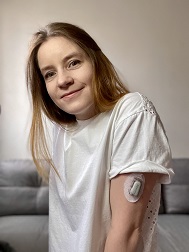During the current COVID19 pandemic, nearly one-third of us had to resort to remote medical care with every fifth person dissatisfied with what it provided. It does not have to be like this. These are my suggestions about what to remember when managing diabetes when coronavirus is circulating around the globe and a few ideas for how to prepare for your online doctor consultations.
Test your blood sugar more often when working from home
As we are considered at high-risk of COVID complications if we get the virus, people with diabetes, should pay particular attention to our health, especially now. More frequent checks of our blood sugar level can help us monitor during this worrying situation. By working remotely, it is likely we are leaving the house less often, and may also be eating more. This could affect our blood sugar levels. As a result, additional adjustments may need to be made to reduce the risk of hyperglycemia. If you are finding you have high numbers, remember to check your urine ketone levels. (By the way, make sure you have ketone test strips in your medicine chest.)
Being at home can also have an impact on eating habits. Do you have a tendency to snack more frequently because ‘the fridge is somehow closer’? This isn’t unique to diabetes, but it can be easy to forget that this needs to be included in your insulin doses, even if it means increasing the insulin amount.
If, on the other hand, working from home became your opportunity to start exercising and change your eating habits, be sure to adjust your insulin doses to avoid the risk of hypoglycemia. Not only does it have a negative effect on the nervous system, but it also stimulates the hunger center which increases the risk of obesity.
Stock up on drugs and accessories – but don’t stockpile
The situation in the country and the world is changing very quickly. Whichever country you live in, you should be prepared for the possibility of going into lockdown, which may make going to the pharmacy or getting supplies difficult. Having a two-month supply of insulin, blood glucose test strips, ketone test strips at home will make you feel much safer. In many countries, prescriptions for drugs and for the reimbursement of medical devices can be issued through online doctor consultations. Check if prescription drugs in your country can be ordered at any online pharmacy (and how to collect them). In many countries, medical equipment can be sent to your home too.
At the same time, remember that there is no need to stockpile. Ordering more than you need for a couple of months can lead to medication or supply shortages.
And if you are confined to your house, the extra time spent at home may be a good opportunity to check your body's sensitivity to insulin (the amount of insulin needed for corrections and for the amount of carbohydrates according to the time of day) or the correctness of basal insulin dosing if you use a pump. Experience of diabetes, diet, and physical activity can all influence insulin sensitivity. Before testing, though, remember to consult your doctor.
How to prepare for an online consultation?
In the new world, consultations with your doctor are often being done by phone or video call.
- When making your appointment, ask how it will take place and also the documents the doctor requires. Most often these are glucose meter or CGM/FGM reports, as well as your latest results from any medical tests. Find out if and how these files can be sent in advance.
- Generating reports yourself is very easy provided that you are using a Bluetooth enabled glucose meter with a dedicated app on your phone. If you also record both insulin doses and the amount of carbohydrates, you can provide a more complete picture that helps your doctor determine the cause of any instances of abnormal glycemia.
If you take the data from a pump or blood glucose meters, try to download it a week before your visit. Should you face any difficulties, you will have time to correct them (some pumps can be read with a compatible meter). Remember to keep a copy of the report for yourself.
- Two days before the appointment, send the reports to the doctor. Analyze the results yourself and mark all the points that raise any of your doubts.
- Write down the questions on a piece of paper, preferably by numbering according to the points on the graphs. Make a list of all the issues you want to address (prescriptions, test referrals, worrying symptoms, etc.).
Even if the doctor does not require any documentation from you, try to find time to prepare the average blood glucose levels in the morning, before and 2 hours after lunch and at night, the average number of daily doses of insulin (basal + boluses) and the results of the latest tests. I find it makes the conversation much easier if you have this to hand. But do not worry if you do not have time to prepare these details, as many of us do not have the time.
What not to miss during an online consultation?
- If possible, the appointment should take place in a setting that is comfortable for you, i.e. in a place undisturbed by noise, with a comfortable seat. But in reality, this isn’t always possible. If you can’t do find somewhere quiet, your healthcare team will understand and it is more important to keep the appointment,
- If you plan to talk to your doctor over the internet, check your connection quality (e.g. by video calling your family).
- Please be available at least 5 minutes before the online doctor consultation.
- Have something to write nearby.
- At the end of the consultation, ask whether you can send additional questions by e-mail, provided that you have any.
In my opinion, online consultations are not that bad. Now that I have been diligently preparing for them, I have started to enjoy this way of contacting my doctor. It seems simple. There’s no time wasted getting to the doctor’s office. No risk of contracting COVID-19. And, just like in the case of a traditional appointment, I can talk about my diabetes and, right after the appointment, go to the kitchen to relax with a cup of homemade coffee. Good luck!



